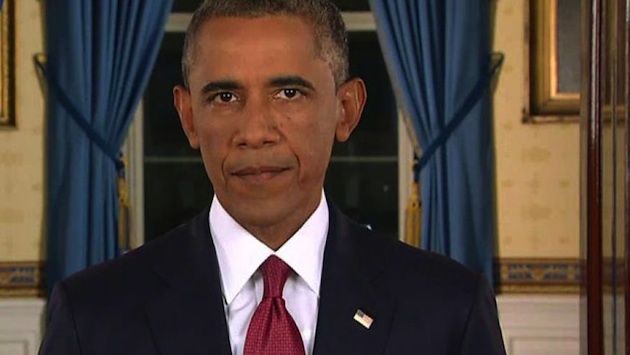

President Obama’s address to the nation on Sept. 10, 2014. (FOX News)
President Obama on Wednesday told the nation he has ordered the U.S. military to attack the terror army ISIS that filled the vacuum in Iraq after the U.S. withdrawal. The president said he is authorizing U.S. airstrikes in Syria along with expanded airstrikes in Iraq as he vowed to wipe out the group’s terrorists “wherever they exist.”
“Our objective is clear: we will degrade, and ultimately destroy, ISIL through a comprehensive and sustained counter-terrorism strategy,” Obama said during a prime-time address to the nation.
The president’s address, which was just 15 minutes long in length, was a dramatic turnaround from the administration’s approach to ISIS, otherwise known as the Islamic State of Iraq and Syria. It was only a few months ago when President Obama downplayed the group’s advances through northern Iraq and called then a “JV” team compared to Al Qaeda. However, he now outlined a “comprehensive” strategy for targeting the army in Iraq and Syria, including aiding the so-called moderate Free Syrian Army.
Sen. John McCain (R-AZ), who has always supported aiding the opposition, said army the rebels now will be “extremely difficult” due to how long the president has waited. On the need to now confront another enemy in Iraq, McCain said the president’s failure to negotiate a status of forces agreement, which would have left behind U.S. forces in Iraq, was the cause of the vaccuum.
The administration has long said they could not negotiate an agreement because the Iraqis did not want it, but McCain says that is flat-out false.
“I know they wanted us there. Sen. Graham and I were both there and they told us they wanted U.S. forces left behind.”
Meanwhile, the president said he does not need the authority from Congress to wage a long, protracted war but welcomed congressional support.
“My copy of the Constitution says Congress has the power to declare war,” Texas Sen. Ted Cruz said. “But he just declared he has the authority to do this.”
On the other hand, President Bush asked Congress for the authorization to use force in both Afghanistan and Iraq. Lawmakers from both sides of the aisle disapproved of the fact that Obama will not ask for a congressional vote to authorize military force against the Islamic State.
The president also said the U.S. will lead a “broad coalition” against ISIS.
“This counter-terrorism campaign will be waged through a steady, relentless effort to take out ISIL wherever they exist using our air power and our support for partner forces on the ground,” Obama said. In making the case, he cited the threat of Americans and other foreign fighters in the region returning to their home countries to “carry out deadly attacks.”
But as of now just 9 countries have signed on to the president’s plan. In comparison, President Bush put together a 37-country coalition to prosecute the Iraq War. Still, some of the president’s speech could be characterized as Bush-light. In one familiar line, the president said regarding Syria, said “If you threaten America’s core interest, you will find no safe haven.”
“I have made it clear that we will hunt down terrorists who threaten our country, wherever they are. That means I will not hesitate to take action against ISIL in Syria, as well as Iraq.”
Senior administration officials, on a conference call before the speech, said the president has authorized those airstrikes, and the military “will take action on the Syrian side” of the border. White House officials also told the media that the president’s decision to go bold was made in just the last 48 hours, leading many to question whether recent polls weighed to heavily on his decision-making process.







